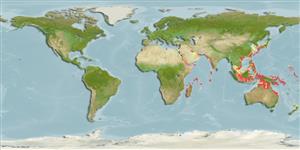>
Ophidiiformes (Cusk eels) >
Bythitidae (Livebearing brotulas)
Etymology: Microbrotula: Greek, mikros = small + Latin, brotula, -ae = little, bud, shoot (Ref. 45335); bentleyi: Named for Andrew Charles Bentley of Port Elizabeth, South Africa, now at the University of Kansas, USA, for his enthusiasm and help in the development of a program on western Indian Ocean fishes, and for collecting the holotype..
Environment: milieu / climate zone / depth range / distribution range
Ecologia
marinhas associadas(os) a recifes; intervalo de profundidade 0 - 55 m (Ref. 54832). Tropical
Indo-Pacific: South Africa to the Red Sea and from the Philippines to Cape York Peninsula in northern Australia; widely distributed and large gap in the distribution is probably a collecting artefact rather than indicative of a true distribution.
Tamanho / Peso / Idade
Maturity: Lm ? range ? - ? cm
Max length : 4.0 cm SL macho/indeterminado; (Ref. 54832); 4.1 cm SL (female)
Descrição suscinta
Morfologia | Morfometria
Raios dorsais (total): 61-70; Raios anais : 50 - 57; Vértebras: 44 - 47. This species is distinguished by the following characters: vertebrae 11-12+33-35=44-47; fin rays, on dorsal 61-70, anal 50-57, pectoral 15-17, caudal 7-8; anterior dorsal fin ray above vertebra number 7-8, anterior anal fin ray below dorsal fin ray number 12-16, anterior anal fin ray below vertebra 13-16; small forward-curved spine at lower angle of preopercle, hidden by skin; fleshy interorbital width 4.5-7.0% SL; palatine teeth papillae-like or absent (Ref. 88975).
Found from near the surface to 55 meters in protected reef structures (Ref. 54832). Solitary inhabitant of reef crevices, cryptic (Ref 90102).
Ciclo de vida ou comportamento de acasalamento
Maturidade | Reprodução | Desova | Ovos | Fecundidade | Larvas
Schwarzhans, W. and J.G. Nielsen, 2011. Revision of the genus Microbrotula (Teleostei: Bythitidae), with description of two new species and a related new genus. The Beagle, Records of the Museums and Art Galleries of the Northern Territory 27:147-160. (Ref. 88975)
Status na Lista Vermelha da UICN (Ref. 130435)
Ameaça para os humanos
Harmless
Uso pelos humanos
Mais informação
Nomes comunsSinônimosMetabolismoPredadoresEcotoxicologiaReproduçãoMaturidadeDesovaAgregação de desovaFecundidadeOvosDesenvolvimento dos ovos
Idade/TamanhoCrescimentoPeso-comprimentoComprimento-comprimentoFrequências de comprimentoMorfometriaMorfologiaLarvasDinâmica larvalRecrutamentoAbundânciaBRUVS
ReferênciasAquaculturaPerfil para aquaculturaEstirpesGenéticaElectrophoresesHereditariedadeDoençasProcessamentoNutrientsConversão de massa
ColaboradoresFotosStamps, Coins Misc.SonsCiguateraVelocidadeTipo de nataçãoÁrea branquialOtólitosCérebrosVisão
Ferramentas
Relatórios especiais
Baixar XML
Fontes da internet
Estimates based on models
Preferred temperature (Ref.
123201): 22.9 - 29, mean 27.5 °C (based on 576 cells).
Índice de diversidade filogenética (Ref.
82804): PD
50 = 0.5039 [Uniqueness, from 0.5 = low to 2.0 = high].
Bayesian length-weight: a=0.00457 (0.00179 - 0.01169), b=3.10 (2.87 - 3.33), in cm total length, based on LWR estimates for this (Sub)family-body shape (Ref.
93245).
Nível Trófico (Ref.
69278): 3.2 ±0.5 se; based on size and trophs of closest relatives
Resiliência (Ref.
120179): Elevada, tempo mínimo de duplicação da população menor que 15 meses (Preliminary K or Fecundity.).
Fishing Vulnerability (Ref.
59153): Low vulnerability (10 of 100).
